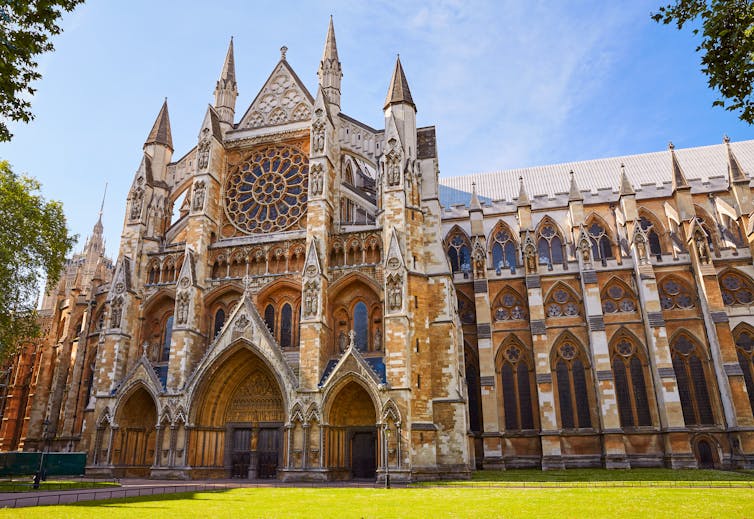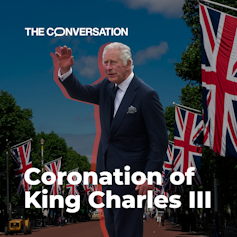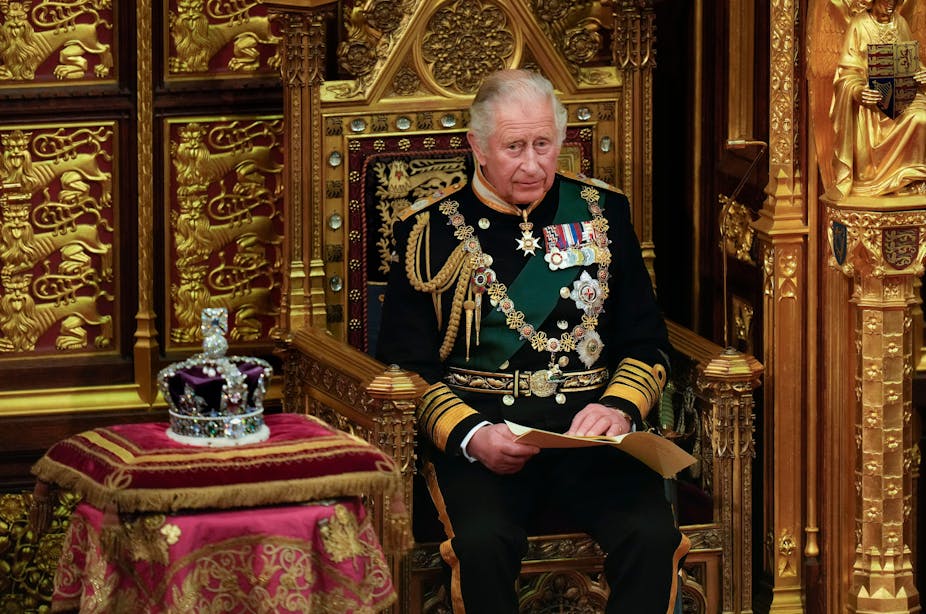The crowning is perhaps the most famous part of British coronations. Yet easily overlooked – and equally important – is the coronation oath, which has been a fundamental component of the ceremony since medieval times.
It is of such significance that the remainder of the rite cannot proceed unless it has been sworn. Why? The oath is the essential counterpart to the recognition and acclamation.
The recognition is the moment at the beginning of the ceremony when the monarch is presented to the people for approval. The acclamation is the moment in which the people accept the new monarch.
Together, these three acts establish a contractual relationship between sovereign and peoples. By public commitment to the promises and values enshrined in the oath, the monarch is forming a bond to the largely uncodified constitution (the UK’s constitution has never been assembled into a single written document).
There has been talk of a shorter service for Charles III’s coronation. But to omit these vital stages would amount to constitutional vandalism.
Before primogeniture (the law of firstborn inheritance), the British monarchy was elective. In Anglo-Saxon times, the witan (the leading nobles or council of the country) chose the new sovereign. And until at least the middle ages, a secular enthronement, preceded the coronation service.
Today’s acclamation comes from that tradition of electing a sovereign. This is when the officiant (usually the Archbishop of Canterbury), standing with the candidate in Westminster Abbey, asks whether or not the congregation recognises the candidate’s entitlement to be crowned.

Those present acclaim the person as their monarch, crying “God save the King/Queen”, representing the country. Some historians contest the acclamation’s importance on the grounds that the respondents are unrepresentative of the people and unlikely to reject the candidate: “as if there was any choice in the matter”.
Nevertheless, it is vital to what follows that they are asked at all. In Portugal, under the Avis dynasty, the acclamation assumed such supreme importance that the crowning withered away altogether. By contrast, Russian peasants were never asked for consent to recognise a new Tsar.

This piece is part of our coverage of King Charles III’s coronation. The first coronation of a British monarch since 1953 comes at a time of reckoning for the monarchy, the royal family and the Commonwealth.
For more royal analysis, revisit our coverage of Queen Elizabeth II’s Platinum jubilee, and her death in September 2022._
Following the acclamation, the candidate must commit to their side of the contract – the terms set out in the coronation oath. “Coronation oath” is a slight misnomer. It is actually a series of promises in question and answer form, sealed by an oath sworn “in God’s presence”. The text of the promises has evolved, but the core has remained.
In the version lasting (with tweaks) from 1308 to 1685, the candidate promised to confirm the laws of their predecessors, to maintain peace, to administer impartial justice with mercy and to preserve and enforce the laws that parliament would pass.
The makings of a modern oath
The Glorious Revolution of 1688-1689 ushered in a major change when a revised oath became statutory. The version used for Queen Elizabeth II’s coronation in 1953 had three essential parts and retained the oath’s medieval core.
Firstly, would she promise: “to govern the Peoples … according to their respective laws and customs?” Secondly, would she cause: “Law and Justice, in Mercy, to be executed in all … [her] judgements?” Lastly would she: “maintain the Laws of God and the true profession of the Gospel” as well as “maintain in the United Kingdom the Protestant Reformed Religion established by law”?
Afterwards, came the oath proper. Elizabeth II swore:
The things which I have here before promised, I will perform and keep. So help me God.
As this shows, the monarch swears to uphold certain key values: law, justice and mercy (although Charles has said he sees himself as a “defender of faiths” and the service is likely to reference other denominations and religions).
That obligation speaks to the nation, but also broadcasts a global message of what the United Kingdom stands for.
The coronation oath marks the moment the monarch’s actions and words correspond to the trust placed in them by the people when they recognised and acclaimed them as their king or queen. Together, the two stages form a contract on the basis of which the service can proceed to the crowning.
There is a sense that uncrowned (and therefore unsworn) monarchs were, and are, not fully sovereign. Would Richard III have usurped the crown so easily had one of the princes in the tower been crowned? Might Lady Jane Grey (the nine-day queen) have seen off Mary Tudor if she had reigned long enough to undergo coronation? As it was, Mary I led the only successful coup d’état of the 16th century.
Writing of Edward VIII, who abdicated in 1936, the late Queen Mother commented that it was fortunate that “he was never crowned”. Clearly, an abdication post-coronation would have been more problematic because the coronation oath establishes accountability.
Breach of contract can, for a sworn monarch, have terrible consequences. The charge of flouting their coronation oaths was levelled against Edward II (deposed and murdered), Richard II (ditto), Charles I (deposed and executed) and James II (deposed and exiled). Those kings could not be trusted because they had broken their sacred word.
The oath is at once a conduit for tradition, a constitutional pillar, a source of legitimacy and authority and a marker of national values. The coronation oath binds monarch to peoples and to the governmental system of the state, but it also communicates some of the principles – law, justice and mercy – upon which that governance rests.
Oaths are still an important part of employment in the British armed services, police force, parliament, privy council and law courts. Each of those oaths mentions allegiance, service or loyalty to the sovereign. How incongruous it would be if the person at the summit of the constitutional pyramid had no oath to swear themselves.![]()
David Crankshaw, Lecturer in the History of Early Modern Christianity, King's College London and George Gross, Visiting Research Fellow, King's College London
This article is republished from The Conversation under a Creative Commons license. Read the original article.



